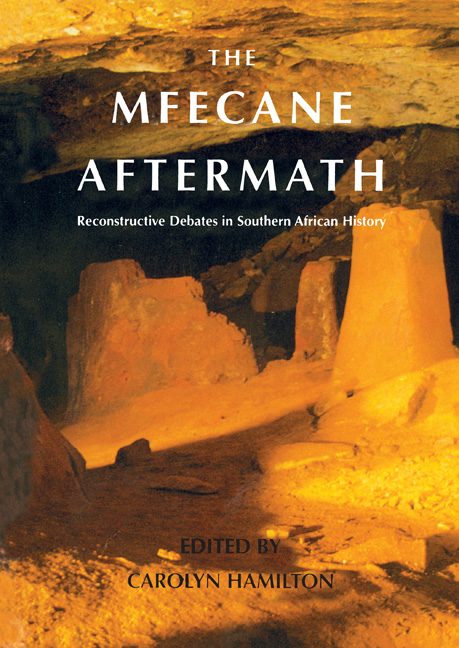Book contents
- Frontmatter
- Contents
- Maps
- Preface
- Acknowledgements
- Notes on Orthography and Names
- Contributors
- Introduction
- Part One Historiography and Methodology
- Part Two The South-Eastern Coastal Region
- Part Three The Interior
- ‘The Time of Troubles’: Difaqane in the Interior
- 11 Archaeological Indicators for Stress in the Western: Transvaal Region between the Seventeenth and Nineteenth Centuries
- 12 Prelude to Difaqane in the Interior of Southern Africa C.1600-C.1822
- 13 Conflict in the Western Highveld/Southern Kalahari c.1750-1820
- 14 ‘Hungry Wolves’: The Impact of Violence on Rolong Life, 1823-1836
- 15 The Battle of Dithakong and ‘Mfecane’ Theory
- 16 Untapped Sources: Slave Exports from Southern and Central Namibia up to c. 1850
- Glossary
- Abbreviations
- Bibliographer's Note
- Bibliography
- Complete List of Papers Presented at the Colloquium
- Index
‘The Time of Troubles’: Difaqane in the Interior
from Part Three - The Interior
Published online by Cambridge University Press: 31 May 2019
- Frontmatter
- Contents
- Maps
- Preface
- Acknowledgements
- Notes on Orthography and Names
- Contributors
- Introduction
- Part One Historiography and Methodology
- Part Two The South-Eastern Coastal Region
- Part Three The Interior
- ‘The Time of Troubles’: Difaqane in the Interior
- 11 Archaeological Indicators for Stress in the Western: Transvaal Region between the Seventeenth and Nineteenth Centuries
- 12 Prelude to Difaqane in the Interior of Southern Africa C.1600-C.1822
- 13 Conflict in the Western Highveld/Southern Kalahari c.1750-1820
- 14 ‘Hungry Wolves’: The Impact of Violence on Rolong Life, 1823-1836
- 15 The Battle of Dithakong and ‘Mfecane’ Theory
- 16 Untapped Sources: Slave Exports from Southern and Central Namibia up to c. 1850
- Glossary
- Abbreviations
- Bibliographer's Note
- Bibliography
- Complete List of Papers Presented at the Colloquium
- Index
Summary
Difaqane: Evolution of the Word
For the last thirty or forty years the term difaqane has been used very broadly by historians, for the wars of the 1820s and 1830s west of the Drakensberg. This usage, covering Sotho/Tswana/Pedi areas as a cognate of the term mfecane used for areas inhabited by Nguni-speakers, was taken up by Monica Wilson and Leonard Thompson in the first volume of their Oxford History of South Africa (1969). Difaqane, like mfecane, was then perpetuated and popularised even into apartheid state ideological pronouncements and school textbooks. Eccentric spellings such as ‘difakane’ and ‘defikane’ have also crept in, attempting to indigenise the word for linguistic areas where the concept had not previously been used.
The word and concept of difaqane have a history that long predates their use in twentieth-century ‘liberal’ or apartheid historiography. The word itself, spelt lifaqane in southern Sotho orthography (though still pronounced the same as di-), goes back at least to the 1890s - and quite possibly half a century earlier in Lesotho historiography. Certainly, the fundamental assumptions behind the use of the term in the traditional historiography of Lesotho go back to the 1830s.
Lifaqane - as the plural form of faqane, meaning ‘wandering horde’ - appeared in print at least as early as 1892 in an article by the prolific Lesotho poet, playwright and historian Azariel Sekese (1849-1930), in a copy of the newspaper Leselinyana la Lesotho. The term lifaqane was then taken up by other historians of the southern Sotho, notably James Macgregor and Daniel Frederic Ellenberger, who extended its usage to apply to the wars caused by ‘wandering hordes’ around Lesotho in the 1820s - rather than just to the ‘hordes’ themselves.
This all begs the question of when and how the word lifaqane emerged. Sekese or a predecessor could have got it direct as an existing Sotho word from oral sources, or as a back-formation into Sotho from English and Xhosa language publications. As Jeff Peires shows, the word ‘ficani’ was used in George Thompson's Travels and Adventures in Southern Africa as early as 1827, in an account of Matiwane's Ngwane and Hlubi.
- Type
- Chapter
- Information
- Mfecane AftermathReconstructive Debates in Southern African History, pp. 301 - 306Publisher: Wits University PressPrint publication year: 1995

